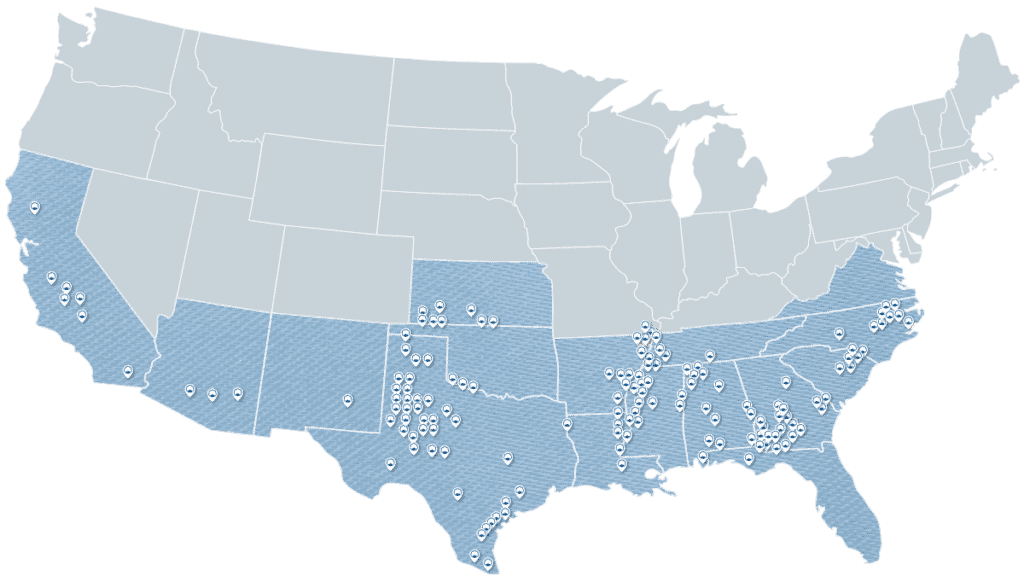About the Trust Protocol
Launched in 2020, the U.S. Cotton Trust Protocol is designed to set a new standard in more sustainably grown cotton, ensuring it contributes to the protection and preservation of the planet, using the most sustainable and responsible techniques.
The program’s mission is to bring quantifiable and verifiable goals and measurement to the key sustainability metrics of U.S. cotton production with a vision where transparency is a reality and continuous improvement to improve our environmental footprint is the central goal.
Aligned with the U.N. Sustainable Development Goals, the Trust Protocol is the only system that provides quantifiable and verifiable goals and measurement and drives continuous improvement in six key sustainability metrics – land use, soil carbon, water management, soil loss, greenhouse gas emissions, and energy efficiency. As well as the world’s first sustainable cotton fiber to offer article-level supply chain transparency to all members.
In the United States, cotton is produced in the ‘Cotton Belt’ which is comprised of 17 states stretching east to west from Virginia to California. The U.S. Department of Agriculture approximates that cotton production covers 12.1m acres, with Texas being the largest producer contributing approximately 40 percent in recent years. Other top cotton producing states include Georgia, Mississippi and Arkansas.
By collecting data on key environmental metrics, the Trust Protocol sees its role as providing grower members with self-assessment and benchmarking capabilities to identify areas of improvement in their operations.
Program Memberships & Accreditations
The Trust Protocol is proud to be accredited by and a member of many recognized sustainable organizations and initiatives.
Accepted as Sustainable Cotton
- Increase uptake of sustainable cotton by promoting participation in sustainable cotton growing programs like the U.S. Cotton Trust Protocol
- Reduce water use and improve water quality and soil health
- Orientates its work on the OECD Due Diligence Guidance and on international agreements and guidelines that define the principles of social, environmental, and economic sustainability and the framework for corporate responsibility
- Provides an implementation framework and reporting format for corporate due diligence
- Members indicate how much cotton they source and how much of it is sustainable or organic cotton, certified by recognized standards
Sector Integration
Cascale is an alliance for sustainable production in the apparel, footwear and textile industries.
- Members includes over 250 global organizations from multiple sectors who have committed to furthering sustainability and transparency throughout the value chain
- Includes a Member Expert Team for Cotton metrics.
- World’s largest database for sustainability standards
- Offers users access to comprehensive, verified, and transparent information on over 300 standards for environmental protection, worker and labor rights, economic development, quality, food safety, and business ethics
- Organizations included within the standards map must address at least one pillar of sustainable development, and/or focus on ethics and quality management

ISEAL is a global membership organization that supports credited sustainability systems in their work, with the goal to drive greater impact and establish markets that are a force for good. Following a rigorous and meticulous approval process, the U.S. Cotton Trust Protocol was accepted as a community member of ISEAL, only eighteen months after the program’s launch.
- Focuses on a wide variety of global challenges such as the climate emergency, biodiversity crisis and human rights issues among others
- Works to define credible practices for sustainability, foster collaboration and shared experience, deliver expertise and training, and promote innovation to strengthen sustainability systems
Industry Pledges Alignment
As well as being accredited by and member of many programs and organizations, the Trust Protocol is also aligned with recognized sustainability initiatives with the goal to improve environmental impact.
The Fashion Pact is a global coalition of companies in the fashion and textile industry all committed to a common core of environmental goals in three areas: stopping global warming, restoring biodiversity, and protecting the oceans.
- Science-based targets to keep global warming below 1.5 degrees by reducing GHG emissions by a target of 39%
- Restore biodiversity through integrated pest management, soil quality and water availability
- Protect the oceans through stopping plastic use from cotton, and integrated pest management
UN SDGs are a collection of 17 global goals designed to be a ‘blueprint to achieve a better and more sustainable future for all.’ The SDGs were set in 2015 by the United Nations General Assembly with the intention for governments to achieve their sustainability goals by 2030.
- The Trust Protocol contributes to UN SDG 6 – Clean Water and Sanitation – as grower members optimize water management and reduce runoff pollution
- UN SDG 12 is Responsible Consumption and Production, and the Trust Protocol grower members further this goal by establishing measurable targets, regularly tracking and reporting energy, water and materials consumed, establishing and maintaining proactive environmental management systems, and improving resource efficiency as well as increasing supply chain and resource security
- The Trust Protocol is aligned to UN SDG 13 – Climate Action – as cotton has the natural ability to remove greenhouse gases from the atmosphere, and grower members have further committed to this goal by improving soil health and using innovative technologies
- The program also supports the following SDGs: Affordable and Clean Energy (SDG 7), Life Below Water (SDG 14), Life on Land (SDG 15) and Partnerships for the Goals (SDG 17)
Launched at COP24 and renewed at COP26 in 2021, the charter contains the vision to achieve net-zero emissions by 2050.
- Commit to 39% aggregate GHG emission reductions
- Commit to prioritizing materials with low climate-impact without negatively affecting other sustainability aspects— Trust Protocol cotton is among the lowest of climate impact textiles
- Commit to pursue energy efficiency across the value chain with a 15% target decrease
- Build strategic alignment with other brands by collaborating across the value chain





